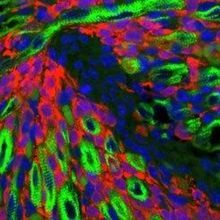epithelial cells

Garbage to Guts: The Slow-Churn of Plastic Waste
Iris Kulbatski, PhD | Mar 13, 2023 | 4 min read
The winding trail of environmental microplastics is leading researchers to the human digestive ecosystem.

Sweet Taste Receptors Regulate Proteins in Developing Fruit Flies
Tess Joosse | Nov 14, 2022 | 2 min read
An unexpected find shows that sweet-sensing receptors also help epithelial cells in Drosophila larvae stay alive amid proteotoxic stress.

In Love with the Shape of You: Physical Scaffolding Defines Organoid Patterning
Sejal Davla, PhD | Aug 8, 2022 | 3 min read
Controlling a growing tissue’s shape achieves deterministic and uniform patterning in intestinal organoids.

Move Over Apoptosis: Another Form of Cell Death May Occur in the Gut
Natalia Mesa, PhD | May 18, 2022 | 6 min read
Though scientists don’t yet know much about it, a newly described process called erebosis might have profound implications for how the gut maintains itself.

DNA Methylation Could Predict Ovarian, Breast Cancers
Anna Napolitano, PhD | Feb 11, 2022 | 5 min read
A pair of new studies finds that analyzing material from a Pap smear can reveal tumor risk in distant parts of the body, potentially allowing early interventions.

Epithelial Cell Signaling Helps Maintain Tissue Integrity
Annie Melchor | Nov 1, 2021 | 2 min read
Using a transgenic fruit fly model, researchers demonstrate how epithelial barriers are maintained in living organisms despite high levels of cell turnover and death.

Human Protein Dissolves Bacterial Membranes
Abby Olena, PhD | Jul 15, 2021 | 4 min read
The protein, apolipoprotein L3, destroys invading microbes by acting as a detergent in the cytosol.

Mysterious Immune Cells Change the Gut Lining to Accommodate Diet
Annie Melchor | Apr 6, 2021 | 4 min read
A study shows gamma-delta T cells in mice respond to shifts in nutrients by changing the cellular composition of the intestinal epithelium.

Questions Raised About Widely Used Blood-Brain Barrier Model
Catherine Offord | Feb 16, 2021 | 6 min read
A study has sparked controversy by suggesting that cells made using a popular lab protocol have been misidentified, with potentially serious repercussions for brain research. Critics say the significance of the findings has been overstated.

The Many Model Systems of COVID-19
Abby Olena, PhD | Nov 4, 2020 | 7 min read
Researchers turn to familiar model animals, along with some fresh strategies, to develop countermeasures against SARS-CoV-2 and investigate the biology of infection.

Could Statins Reduce the Severity of COVID-19?
Ashley Yeager | Jun 12, 2020 | 7 min read
The cholesterol-lowering drugs quell inflammation and reverse endothelial tissue damage, hints that they might curb the body’s excessive immune response to SARS-CoV-2 infection.

Chemosensory Cells in the Nose Play a Role in Allergic Reactions
Abby Olena, PhD | Jan 17, 2020 | 3 min read
In mice, a group of nasal epithelial cells called brush cells release pro-inflammatory signals in response to allergens.

Image of the Day: Van Gogh Microscopy
The Scientist and The Scientist Staff | Jan 10, 2018 | 1 min read
Scientists identify the cells that give rise to the soft tissue cancer rhabdomyosarcoma.
